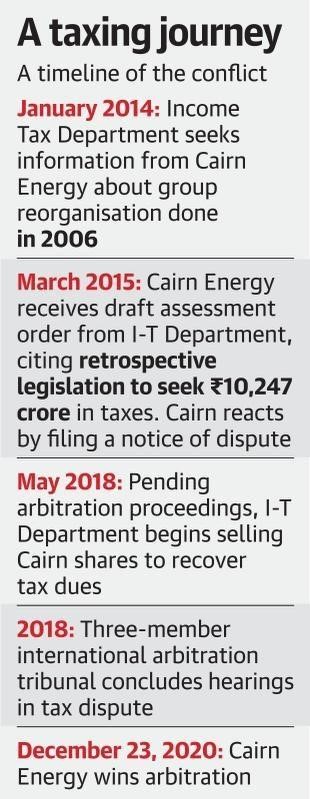[ad_1]
GS Paper 3:
Topics Covered: Effects of liberalization on the economy, changes in industrial policy and their effects on industrial growth.
Context:
British energy major Cairn Energy Plc has finally withdrawn the lawsuits filed against the Indian government and its entities overseas in a ₹10,247 crore retrospective tax case. The company is in the process of dropping cases filed in France and the Netherland, too.
- These lawsuits were filed to seize assets of Air India to recover the money from the Indian government.
Background:
The Cairn’s decision to drop the lawsuits comes after an international arbitration award overturned the levy of ₹10,247 crore retro tax by India and directed it to refund the money to the company.
What’s the issue?
In December 2020, a three-member international arbitral tribunal at the Permanent Court of Arbitration in the Netherlands ruled unanimously that the Indian government was “in breach of the guarantee of fair and equitable treatment”, and against the India-UK Bilateral Investment Treaty, and that the breach caused a loss to the British energy company and ordered compensation of $1.2 billion.
- Cairn had challenged the Indian government seeking taxes over an internal business reorganisation using the 2012 retrospective tax law, under the UK-India Bilateral Investment Treaty.
- In 2014, the Indian tax department had demanded Rs 10,247 crore in taxes.
- In 2015, Cairn Energy Plc commenced international arbitration proceedings against the Indian government.

What next?
The Taxation Laws (Amendment) Bill, 2021, enacted in August scraps the tax rule that gave the tax department power to go 50 years back and slap capital gains levies wherever ownership had changed hands overseas but business assets were in India. This nullifies the tax assessment originally levied against Cairn.
What is retrospective taxation?
- It allows a country to pass a rule on taxing certain products, items or services and deals and charge companies from a time behind the date on which the law is passed.
- Countries use this route to correct any anomalies in their taxation policies that have, in the past, allowed companies to take advantage of such loopholes.
- Retrospective Taxation hurts companies that had knowingly or unknowingly interpreted the tax rules differently.
Permanent Court of Arbitration:
- It was established in 1899 and is headquartered in The Hague, Netherlands.
- It is an intergovernmental organization dedicated to serve the international community in the field of dispute resolution and to facilitate arbitration and other forms of dispute resolution between States.
- All decisions, called “awards” are binding on all the parties in the dispute and have to be carried out without delay.
Insta Curious:
How arbitration, mediation and conciliation are different from each other? Reference
InstaLinks:
Prelims Link:
- What is Arbitration?
- Recent Amendments.
- About the International Court of Arbitration.
- About the Arbitration Council of India.
- Appointment of arbitrators under the 1996 Act.
- Permanent Court of Arbitration- composition, functions and members.
Mains Link:
Discuss the significance of the Arbitration and Conciliation (Amendment) Act.
Sources: the Hindu.
[ad_2]

